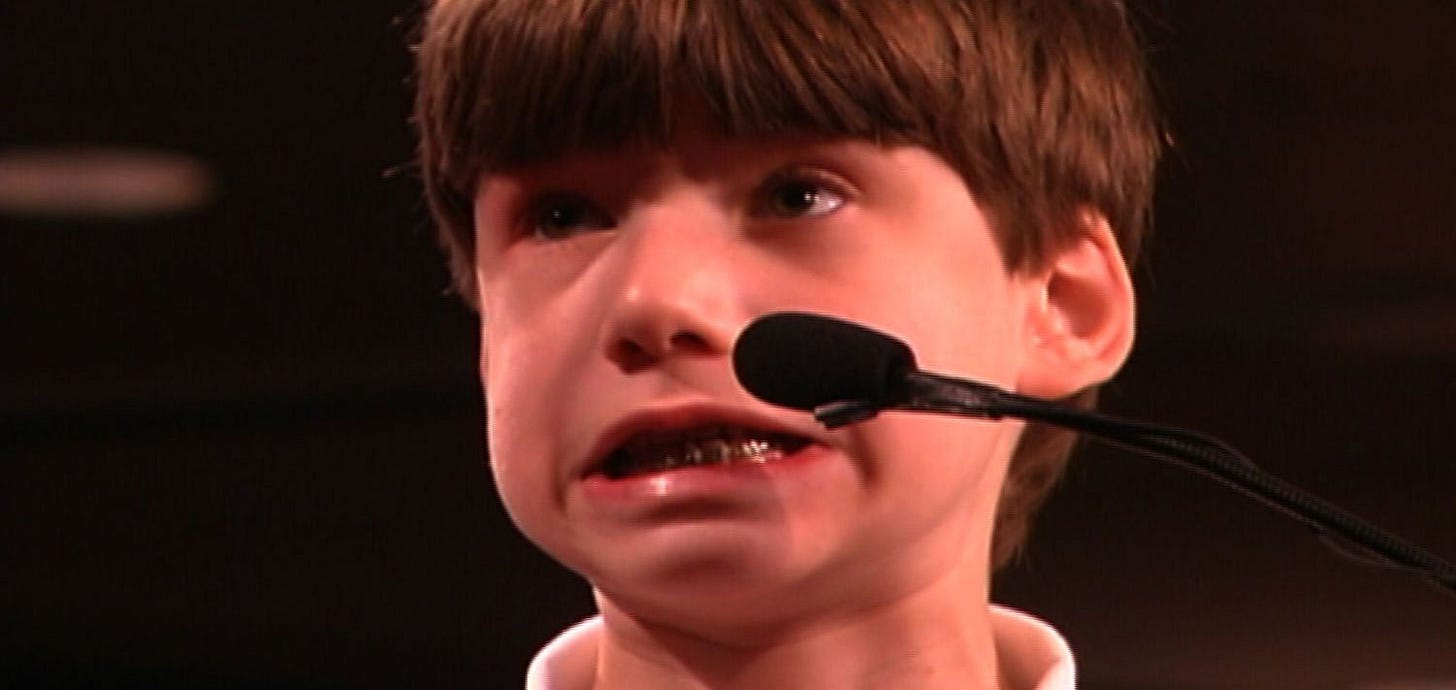Our family recently watched the documentary “Spellbound” (2002), which remains an incredible piece of film-making. Afterwards, my wife (in the grips of “where-are-they-now” curiosity) sent me a magazine article that follows up with the contestants. The article, by the journalist Amy Crawford, is depressing and disappointing, not so much because the characters have had to wrestle with the ravages of adulthood (news flash: even the most touching documentaries have to come down to earth once filming stops) but because Crawford seems to seriously misunderstand the film and what it has to teach us. Indeed, the article anticipates the most most obnoxious tendency of artistic and academic discourse over the past decade: to make the most obvious and literal points while missing the most important one. “Spellbound” is certainly about the American Dream, as Crawford writes, but not quite the dream that she (or some of the characters) assume.
It is a shameful fact that educational inequalities plague our society, and that subsequent life-opportunities are highly constrained by race, class, and geography. “Spellbound” is far from subtle about this social context, but it also humanizes it in powerful ways. For instance, the film begins by interviewing the racist ranch-owners who employ Angela’s immigrant father, Ubando. Yet, the ranchers (an elderly couple) are literally deaf to their own bigotry, while Ubando tells self-deprecating jokes in Spanish and leaves the story of his own agency, bravery, and persistence to be recounted by his son. Later, we see Ashley practicing vocabulary in a fenced off, all-Black public school in Washington, D.C., where the teacher prepping her misspells a simple word, “Oasis.” The poignant detail in the scene is that Ashley corrects the error with grace and respect. Crawford points out that within thirty seconds of meeting Emily, the horseback-rider from suburban Connecticut, we learn that her family employs an au pair. Unremarked, however, is that the subject only comes up because (unlike the previous year) both of Emily’s parents are now taking the time to support her in person, a reminder that money comes with its own hardships. The inequalities are obvious and awful, but they do not define these children or explain their attraction to spelling.
Nor am I convinced that anyone really believes the “myths” that Crawford seeks to dispel. Of course the Scripps Spelling Bee is not entirely egalitarian or meritocratic; most of the contestants admit that they were lucky to get to Washington, and realize that their performance largely depends on the random order in which they receive words. Nor do any of them have any illusions that the bee measures intelligence as such; Emily points out that a definition bee would require far greater amounts of knowledge. And only a cynic would think that participation in the bee is primarily about winning; the worst parts of the movie are when adults strategize and leverage wealth to benefit their children (as Neil’s father does), a trend that has admittedly worsened in the subsequent twenty-five years, enlisting children in a hollow pursuit of credentials and perfection while sucking the joy from almost every youth activity.
None of that is what makes “Spellbound,” spelling bees, or America great.
The Scripps Spelling Bee is a vestige of the 1920s, an era when industrialization, immigration, and the expansion of secondary education drove public nostalgia for an idyllic, imaginary past, typified by the 3 R’s and the oral recitations of the little red schoolhouse. (Fun fact, most nineteenth-century schools were white, not red...) The 1920s were also the dawn of mass media, which tried to combine the respectability of classic music with the excitement of dance-offs, beauty pageants, and hot-dog eating contests. Essentially, the national spelling bee originated as a silly, entirely arbitrary exercise that let people take a rooting interest in middlebrow culture.
Homer Winslow, “School Time” (1874)
Henry Ford at the Scotch Settlement School, which he renovated as a living museum in 1929.
Even before that, and long since, Americans have valued memory and mental acuity in schools for a mixture of religious and commercial reasons: memorizing lessons seemed to develop both mental faculties and personal character, while rewarding the hardest workers in a free enterprise system. The closest corollary in “Spellbound” appears with three Indian-American families. Historically, Indian education has also prioritized memorization, and (in various ways) these families pretty clearly embrace an immigrant narrative of hard work paying off. Neil’s parents, in particular, seem to equate personal fulfillment with a Reagan-esque mixture of entrepreneurship and religious faith. But again, Crawford acts as if the filmmakers endorse this view of the American Dream, which they clearly do not.
So what is “Spellbound” really about?
For one thing, it is a meditation on diversity and public space. In the movie, spelling becomes a neutral meeting ground where students from all walks of life can come together and cultivate shared habits of mind: sort of how Alasdair MacIntyre imagined Scottish universities or L. L. Zamenhof imagined Esperanto. The spelling list becomes canonical; the standards are clear; kids adapt to the rhythm of the thing. There are some concrete educational benefits—e.g., the arcane etymologies instill an appreciation for cultural exchange and the textures of American English—but those aren’t exactly the point. (Who cares if you know how to spell psammophile?). Rather, there seems to be intrinsic value in letting children find their people, giving them a stage on which to shine, and encouraging their communities to take pride in their accomplishments. (When Angela leaves her West Texas town, the school holds a pep rally…because, after all, it’s Texas.) That is why I am an ardent supporter of initiatives like National History Day, which not only bypasses decontextualized academic metrics for authentic historical research, but does so in the context of public exposition, allowing adults to judge students’ accomplishments by what Jack Schneider and Derek Gottlieb call “ordinary measures”: the informal, often intangible qualities that establish a school’s legitimacy with families and community members.
And what about those families and community members? In the film, they are delightfully, sometimes painfully normal. April knows that her folks are right out of a 1970s sitcom. Harry’s mother, a Jewish woman from New Jersey, pities the poor Texan who struggles to spell yenta. Ted’s teacher worries that he doesn’t quite fit with the other boys from rural Missouri, who mostly talk about trucks. Nupur’s middle-school rivals give her grudging credit despite having cooties. At a very basic level, these people don’t understand the competitors (who are special and strange), but they handle them with pride, tenderness, and a little bit of awe. One is reminded of Friedrich Schiller’s observation that, “to a sensitive and moral person, a child will be a sacred object.”
April DeGideo’s parents
And, in keeping with the recurring theme of this blog, the competitors do embody something sacred. Rewatching the film, I could only think of Søren Kierkegaard’s famous prayer:
Father in Heaven! What are we without You! What is all that we know, vast accumulation though it be, but a chipped fragment if we do not know You! What is all our striving, could it ever encompass a world, but half-finished work if we do not know You: You the One, who is one thing and who is all! So may You give to the intellect, wisdom to comprehend that one thing; to the heart, sincerity to receive this understanding; to the will, purity that wills only one thing. In prosperity may You grant perseverance to will one thing; amid distractions, collectedness to will one thing; in suffering, patience to will one thing.
In the end, “Spellbound” is not about intellect or the vast accumulation of knowledge. It is certainly not about material success. It is about young people coming into being, amid distractions, by discovering something within themselves: for the first time in their lives, it seems, they have found the purity to will one thing.






Thank you for this review & for the link to the full documentary! It's such a throwback -- I remember seeing this film shortly after it was released in the early 2000s. Watching it again is like going into a millennial time capsule! Brings back lots of memories of coming of age during that time.